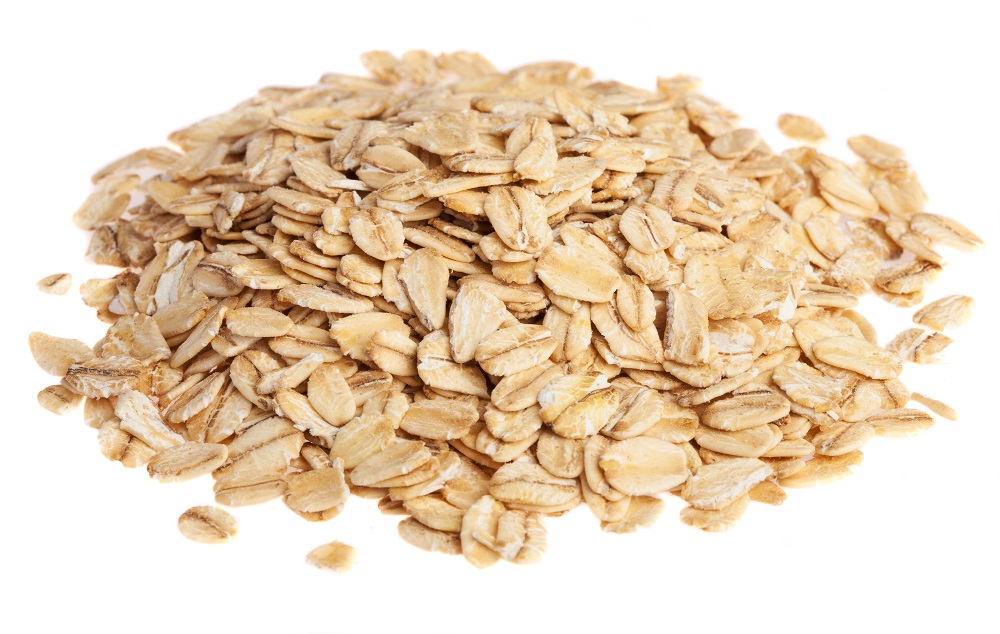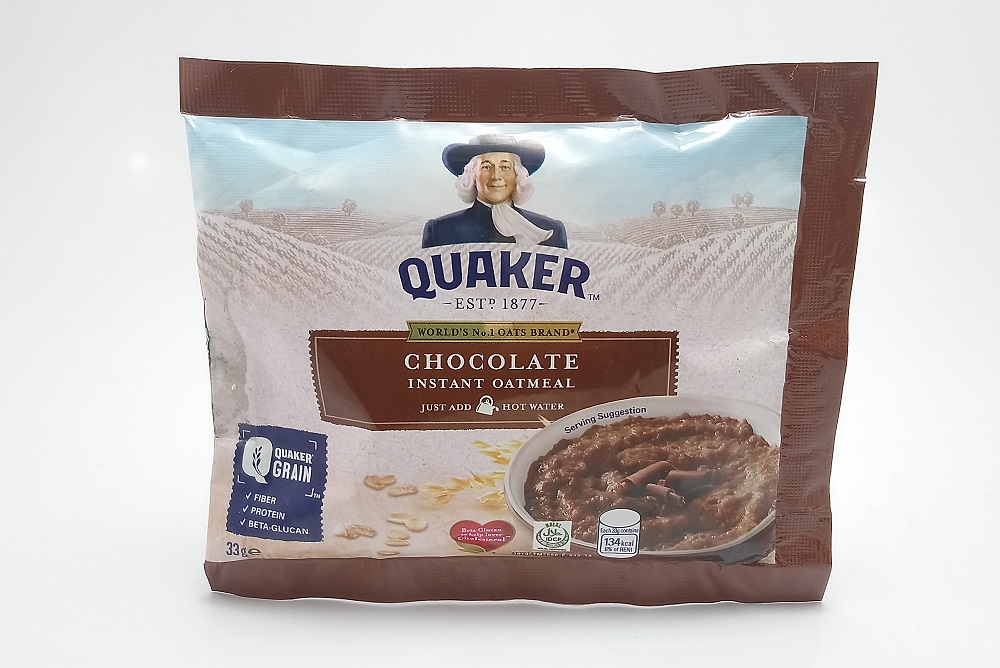Typically prepared by boiling processed oat grains, oatmeal is a traditional staple in many households. Particularly common as a breakfast item, oatmeal is a common food item consumed all over the world.
Oatmeal is perfectly suitable for vegan diets as oatmeal itself is solely derived from a plant source. The only concern for vegans is when other ingredients are added to oatmeal that may be non-vegan. Traditional oatmeal is also preferred as instant oatmeal can also have added ingredients that could be non-vegan.

Oatmeal is a course flour obtained from milling and processing oat grains. A popular everyday dish, oatmeal is difficult to place in history, but cultivated oats have been suggested to originate in Europe back in the Bronze Age (1).
Oatmeal also has a history of being used in a medicinal context. Colloidal oatmeal, made by grinding oatmeal into a fine powder and boiled for extraction, has been used as a topical treatment for various skin conditions such as rashes, itches, and irritations (2).
With different manners of production, oatmeal can be divided into three different categories: steel-cut oats, rolled oats, and quick oats. Due to the different ways these types of oatmeal are prepared, each type comes with different properties.
The least processed type of oatmeal is steel-cut, also known as Irish oatmeal. Steel-cut oatmeal is prepared by chopping the oat grains with large steel blades. The product of this process creates bigger chunks of oatmeal which gives this type a coarser and chewier mouth-feel.
Since this type of oatmeal is relatively large and unprocessed, it takes the most time to prepare with average cooking times of about 15-30 minutes.
Rolled oats, also known as old-fashioned oats, are made by steaming the oat grains and then flattening them. Flattening the oats gives it a distinct texture when compared to steel-cut oats. The steaming process partially cooks it which subsequently lessens the cooking time. On average, rolled oats can be prepared in 2-5 minutes.
Lastly, quick oats are essentially the same as rolled oats but are processed even further to lessen their cooking time. Quick oats can be cooked even faster as they are rolled thinner than rolled oats and are also steamed longer.
By itself, oatmeal is vegan as it is only made of grains from an oat plant (Avena sativa). Minimally processed as oatmeal only needs the oat grains to be milled into a coarse flour, oatmeal is even perfectly suitable for vegans who dislike processed food items.
The problem with oatmeal is when other ingredients are added to it. Many people opt to add ingredients to oatmeal in order to enhance its flavor and nutritional profile.

Upon glancing the aisle in the supermarket, an individual would quickly see that there are two main groups of oatmeal that can be purchased: traditional oatmeal and instant oatmeal.
Traditional oatmeal is any of the three types mentioned above and can be thought of as unadulterated oatmeal. On the other hand, instant oatmeal is often pre-packaged oatmeal that come with additional ingredients for flavor.
Although traditional oatmeal and instant oatmeal have similar nutritional profiles, vegans highly recommend traditional oatmeal over instant oatmeal because of the added ingredients.
While oatmeal is vegan, instant oatmeal often contains ingredients that are either non-vegan or problematic. Non-vegan ingredients added to instant oatmeal can include dairy and honey, while problematic ingredients include sugar.
While most enjoy oatmeal by itself, many choose to add additional ingredients to their oatmeal to enhance its flavor. Adding flavorful ingredients is always recommended so that individuals can enjoy their meals, but caution should be practiced as these ingredients can make oatmeal non-vegan. Here are some common ingredients added to oatmeal and whether they are vegan or not.
Oatmeal can be prepared using water, but many people add milk instead. Adding milk to oatmeal makes the experience similar to eating cereal or porridge. Adding milk to oatmeal not only adds flavor to the dish, but also adds a wide array of nutrients such as calcium, phosphorous, potassium, magnesium, zinc, riboflavin (vitamin B2), vitamin A, and vitamin B12.
However, milk is not vegan as it is an animal-derived product. For a similar experience, vegans have to turn to vegan milk such as almond milk, cashew milk, coconut milk, hazelnut milk, hemp milk, rice milk, and soya milk.
Vegan versions of milk are great alternatives to traditional milk because different kinds of plant-based milk also offers flavor and distinct nutrients depending on their plant sources.
Yogurt is an easy ingredient to add to oatmeal, adding both flavor and nutrition as yogurt is an excellent source of protein and calcium. While you can find plain yogurt in the grocery store, flavored yogurt can also be a good source for adding even more flavor to oatmeal.
Unfortunately, traditional yogurt is not vegan because it is made from milk. The milk is heated to a point that denatures its proteins. When allowed to cool, the microorganisms ferment the sugars in the milk into lactic acid.
Similar to how there are vegan versions of milk, there are also vegan yogurts made from these vegan products; There are yogurt products made of almond milk, cashew milk, and so on.
Many oatmeal recipes call for fruit, both fresh and dried, to add flavor, texture, and even color to an oatmeal dish. Any fruit can be added such as bananas, strawberries, apples, etc., mixing different fruits helps to reduce the monotony of oatmeal.
Fruits are vegan since they are obtained from plants. They are excellent sources of different vitamins and minerals and come with their own natural sugars for flavor.
While fruits are always appropriate for dietary vegans, some fruits might not be considered ethically vegan. This will depend on whether the fruits are sourced from a farm that does not exploit animal or human labor. A good way to make sure fruits are ethically obtained is to get them from a known local source, or if the product comes with a Fairtrade certification (3).
Nuts are a great way to add flavor, texture, and nutrients to oatmeal. Nuts such as walnuts, almonds, macadamia nuts, hazelnuts, and pecans are all great examples of nuts that are both flavorful and nutritious as they contain a good amount of healthy fats such as omega-3 fatty acids.
Nuts are also perfectly suitable for vegan diets. They are mostly edible seeds that are covered with hard inedible shells.
Just like fruits, nuts can also become non-vegan when they are unethically sourced. One recent campaign was against the almond industry in California, US. Given that a single almond is said to take three and a half liters of water to produce, many environmentalists (including environmental vegans) protest that almonds are not environmentally sustainable – especially in California where water is a limited resource (4).
While oatmeal itself is made from a grain, other grains can still be added to oatmeal to enhance its flavor. Grains are extremely healthy as a single grain still comes with three different layers: the bran, the germ, and the endosperm. Put together, each layer constitutes a different variety of vitamins and minerals that make grains highly nutritious.
Grains that can be added to oatmeal include quinoa, amaranth, cracked wheat, and more. These are all plant-based products that make them entirely vegan.
Another great way to add flavor to oatmeal is to use spices. Spices are essentially dried and ground parts of plants such as seeds, fruits, roots, or bark that hold distinct flavor profiles. Examples of spices that work well with oatmeal include cinnamon, paprika, vanilla, black pepper, ginger, and cayenne.
Since spices are made from different parts of plants, no animal products or derivatives are used to make them which makes spices a vegan-friendly option.
References
